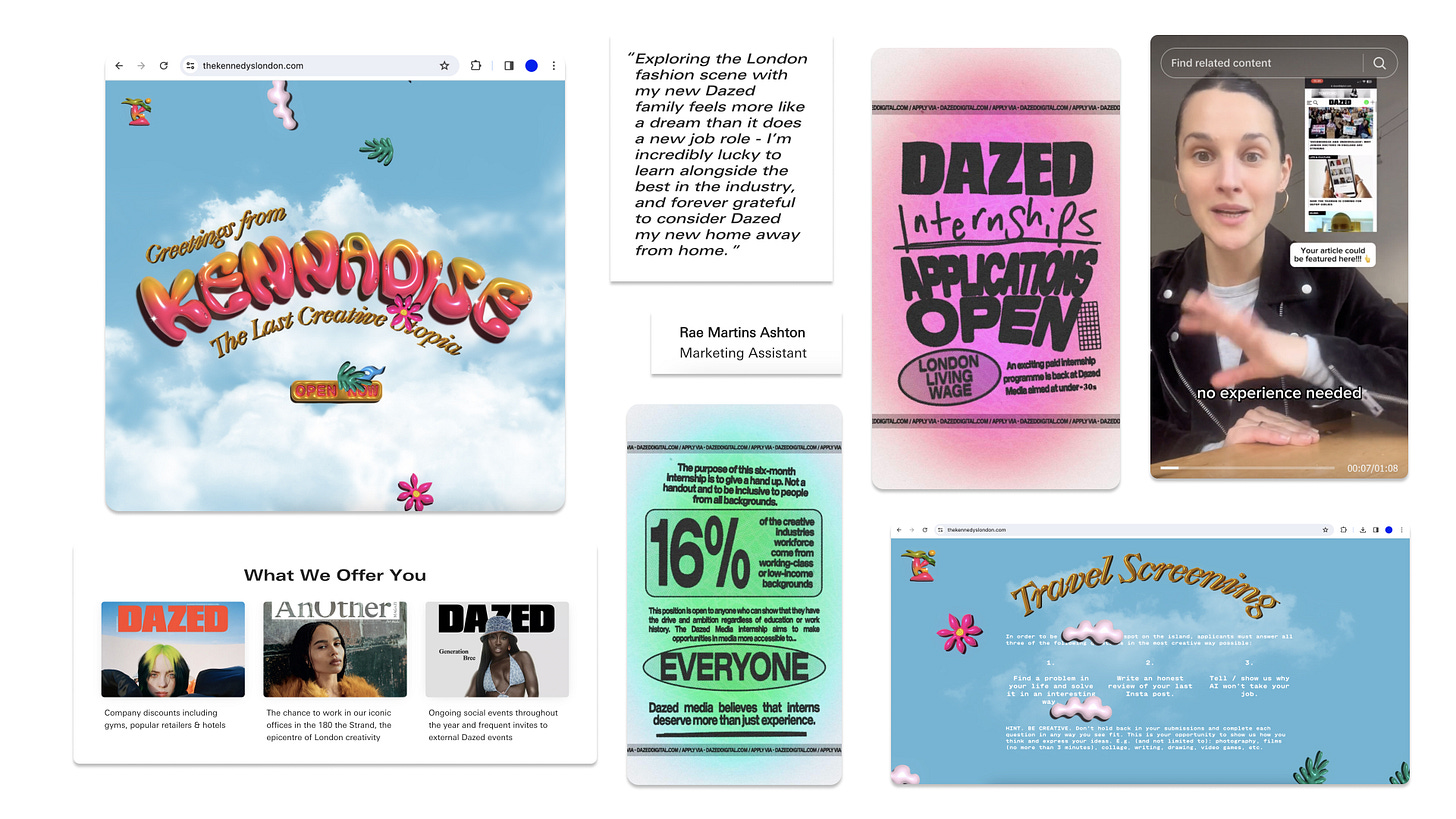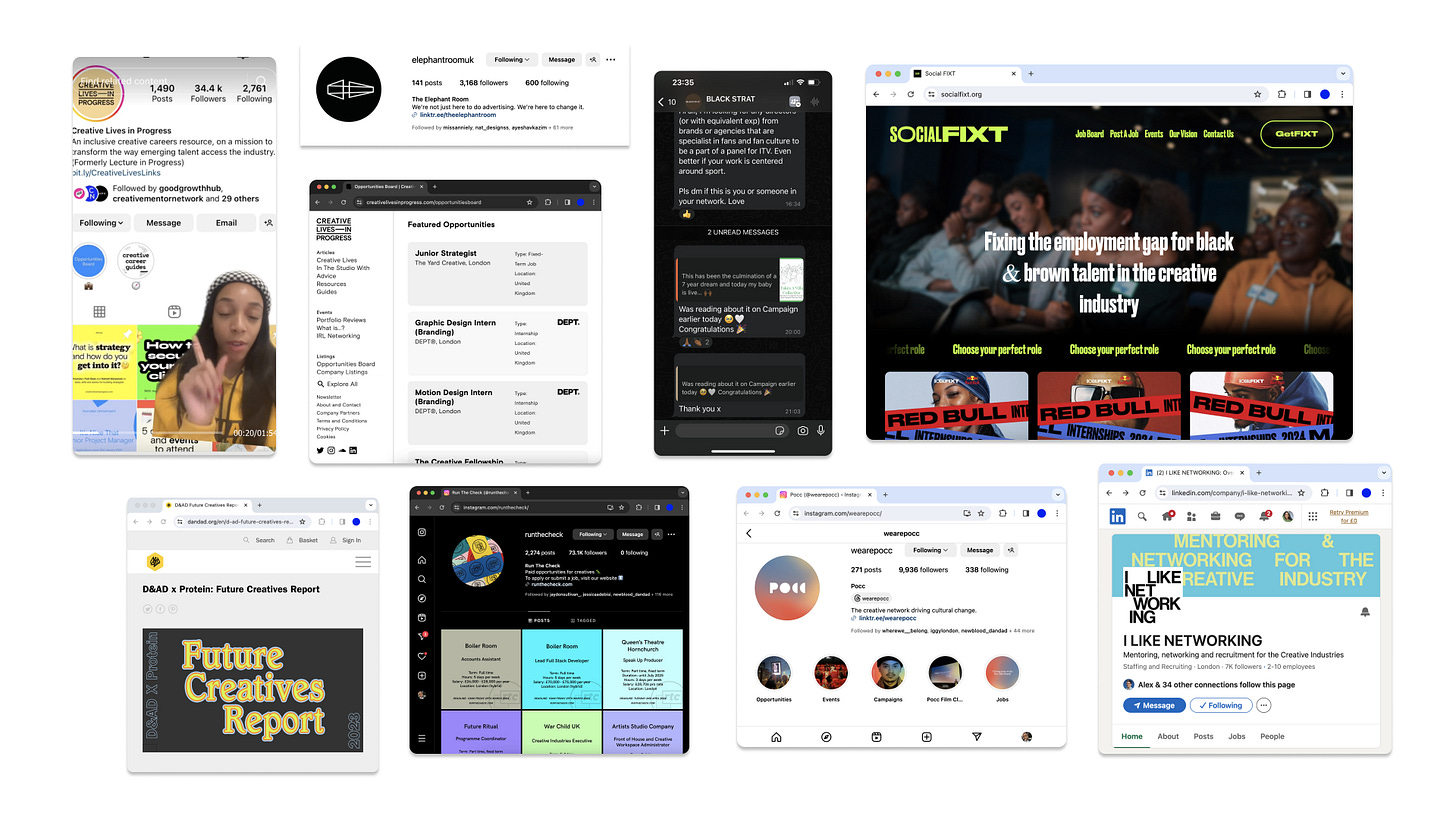002: Are CV's Becoming Redundant in The Creative Industry?
An internal battle exploring the validity of CVs within the creative industry.
When I first began making ramblings about this topic, my opinion on the relevance of CV’s was as leading as the question suggests..redundant. I understood the relevance, but were they actually necessary in the creative industry? I’ve since reflected and altered my opinion slightly so think of this article as an internal battle I once had with myself and decide for yourself whether you agree or disagree with me.
“ Are CV’s becoming redundant in the creative industry?
The answer is yes, you can stop reading now. As I reflect on my journey in the creative industry thus far, I’ve been asked for my CV maybe three times in the past four years and that was mainly by pesky LinkedIn recruiters (I may have a personal vendetta against them but that’s for another day). This article is in no way about bashing CV’s, I actually find them necessary. Like when you double check if you turned off the straighteners despite knowing you did, just to ease your mind. Having a CV on hand, attached to your website or on your LinkedIn stops people messaging you to find out if you have one and is standard practice within the creative industry especially for corporate roles. But in my opinion, I don’t find them pivotal when job hunting. I proudly speak for gen z when we say we are tired of applying for jobs. The application process is dreadful and needs a much-needed update, especially when we upload our CV and then we are asked to manually fill out the details. That’s enough to close the laptop. I can survive on beans, it is never that deep.“
Wow I’m funny, but as you can see I was definitely swaying towards yes and although we will later draw on the validity of my perspective there is so much more to uncover. This article, more pointed towards the advertising industry, specifically roles such as Intern, Creative, Graphic Designer, Art Worker etc can only lean this way. We have portfolios, online presences and networking to help bypass the formalities of an application process. But It’s not until we look beyond ad-land and more importantly all the jobs that sit within it will we truly be able to answer this question fairly.
In my initial research I found several entry level programmes targeted at 18-24 year olds with little to no experience. Dazed Media introduced a paid internship targeting under 30s wanting access into the creative industry. Personal kudos to the company for raising the application age to 30 as this shows signs of trying to be more inclusive even if the pay is just London Living Wage. The process consists of a 3-part application process with step one being as informal as it gets - encouraged to apply via video, voicenote or a written submission before doing a task to show skill set. They have framed CV’s as “boring” and boast about their alternate approach than the typical application process. Kennedise formerly known as The Kennedys, have taken a similar approach stating “CV’s are for losers' “- I mean that’s one way to grab the attention of gen z I guess. The application process is a step up from Dazed, with a task from the get go. Last year's application consisted of answering three varied questions engaging a range of skill sets; research, problem solving, copywriting, personality, and perspective. In my opinion this gets straight to the point, judging someone on their creativity and ability to think in unique ways instead of metrics that alienate people who don’t fit the mould. Some of the most talented people I’ve met have not gone down the traditional pathway. Should they be ostracised for the socio-economic barriers put in place that prevents them from being deemed worthy of a chance? Especially with all that gen z has to offer being seen as the new IT culture that everyone wants to understand, and their proximity to “coolness” for many agencies.

On the other hand I can’t help but draw from my own experiences within the industry, working both as a freelancer and full time employee the process is drastically different with the barriers to entry being vast. Whilst freelancing I was headhunted by the former creative director at Anyways Creative after spotting my work online. Now I can’t confirm or deny if she read through my CV but the focus was on my portfolio. After a quick coffee and an informal chat, I came into the agency working freelance. That went on for about a year before joining the agency full time. Now I wonder what the application process would have looked like if I applied through traditional portals, what would the interview process be like or the hoops I’d have to jump through to be proved equipped for the role? Does being self-employed eradicate some of the headache of a CV, or is it the same demons in a different format? I mentioned my earlier distest for LinkedIn recruiters because honestly I’ve never had anyone advocate me as much myself, negotiate and go to bat for me like I would. Providing recruiters a copy of my CV feels like a rights of passage but has it been pivotal in securing a role? Nope. Especially when most agencies use AI to scan your CV and Cover Letters for key words so what's the actual point? It almost feels like courting if you will, flirting with the prospects of a job transnational from start to finish.
Let’s not even begin to look into how jobs are being advertised in this digital space. It’s important to note that the industry is definitely gate kept by the powers at be (usually a white able-bodied man with heaps of privilege sorry not sorry). Again pulling from my dual experience of being headhunted and working as a creative commissioning talent - other than LinkedIn for the traditional roles, opportunities are announced and circulated within group chats, google groups, members clubs/communities, word of mouth and sometimes a quick instagram story post. The advertising industry especially, is all about networking, who you know is 78.5638% of the job. You recommend someone for a role, they recommend you for something else and vice versa. If the person providing the recommendation has enough clout, all the formalities go out the window and you are catapulted through the process with no need for a CV or a formal interview.

This leads me onto my next thought, looking beyond gen z but at seniors creatives within the industry. The more senior you become the more networking you’ve done over the years and the perception of talent and experience is just expected. The chances of being headhunted is increased, with recruiters and other agencies observing your output for long enough to pounce without going through traditional avenues. In some cases, some people treat your LinkedIn profile as a CV, especially if you keep it updated enough.
As we settle into this digital age, it’s quite obvious we are moving away from tradition and putting the emphasis on talent which can only be shown through portfolios. Whether CVs will be a thing of the past now or in five years we will see because the corporate world thrives on competition and elitism and removing barriers to entrance only disrupts the hierarchy society has put in place. But I do hope brands and agencies look beyond tradition because there's truly some incredible talent being held outside the club due to small formalities. I will admit CVs help to distil information and highlight the role you as an individual played in the production but tasks can tell you so much more about a person than an A4 slide.
Let me know your thoughts, are you pro or against CVs? Do you simply not care? Are CVs necessary for your industry or is it something you no longer update until it’s time to look for another job?

